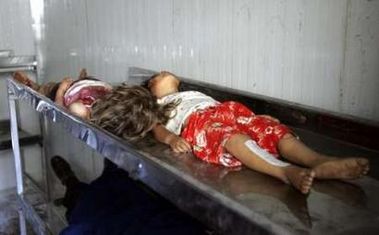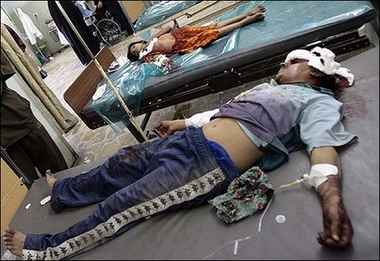BASRA, 9 Jul 2006 (IRIN) - NGOs devoted to health issues in southern Iraq say that dozens of children have died of relatively common diseases since January due to a lack of medicine.
"There are no official statistics about the number of children who have died in Basra since January," said Hassan Abdullah, a senior official in the Basra governorate. "But local health department employees and volunteers from some NGOs have collected information suggesting that about 90 children have died as result of the lack of medicine." According to Abdullah, this is worse than the same period last year, when some 40 children died for similar reasons. Marie Fernandez, a spokeswoman for Vienna-based aid agency Saving Children from War, said that the agency – which has been working with local doctors – has noted a lack of essential supplies, especially intravenous infusions and blood bags. "There’s a lack of everything. Children are dying because of bleeding because there are no blood bags available," said Fernandez. "Antibiotics, Pentostam [an antimony compound used in the treatment of parasite infection], special milk for dehydrated children, and almost all medical material for emergency conditions aren’t available." In Baghdad, Ministry of Health officials say they are struggling to acquire the required medicines, but noted that their efforts were largely impeded by security issues and official corruption. "Because of security problems, it’s difficult to have a complete picture of the problem," said senior ministry official Ahmed Saleh. "We’re going to conduct a thorough study on the cases in the south – especially on the lack of medicine, because corruption is complicating the problem." Rising mortality rates Fernandez noted that about 40 children per day had been admitted to the children’s hospital in Basra since May, due to high temperatures and poor water quality. "Children between the ages of one and three years are the most affected by problems of dehydration and pneumonia, meningitis, malnutrition and typhoid," she said. "And some cholera cases have also been reported." According to doctors at Basra’s Maternity and Child Hospital, about 14 to 16 new cancer and leukaemia cases have also been reported among children each month. "It’s painful to see so many children dying of cancer as a result of inadequate treatment," said Dr Ali Hashimy, an oncologist at the hospital. "If there was medicine, they would have been saved." Two weeks ago, Saving Children from War sent a consignment of medicine worth 250,000 euros to the only two hospitals specialising in child care in southern Iraq. "We’re very happy that some organisations are helping us, but the consignment isn’t enough," said Hashimy. "We urge all international organisations to give more assistance to these innocent victims of war." Specialists also note a disturbing increase of cases of Kala Azar among children, especially at the height of summer and under deteriorating sanitation conditions in Basra. Kala Azar, transmitted by the sand fly, is a chronic and potentially fatal parasitic disease that preys on the internal organs. "There are about 40 to 50 cases of Kala Azar per month in Basra’s Maternity and Child hospital," said Fernandez. "Kala Azar can be completely cured if treated by Pentostam, but it can be fatal without treatment." Pentostam has not been available in southern Iraq for several months – not even on the black market, where the drug had been available last year. A waning professional class A concurrent shortage of doctors and nurses has also been reported in Basra. According to Abdullah, there are no reliable statistics on how many doctors, dentists, pharmacists and nurses have left the area, but unofficial data suggests that at least 200 health professionals have left since January. Health ministry statistics also suggest that an average of 30 doctors and nurses per month have left Iraq over the past year after being targeted by criminal gangs. The emergency unit in the Teaching Hospital was closed for five months after a number of doctors were killed by unidentified attackers while working there. Now many doctors and nurses refuse to go to work, fearing for their lives. "I have a family to look after," said one paediatrician from the Teaching Hospital, speaking anonymously. "Even though it’s my responsibility to look after my patients, I can’t risk turning my sons into orphans – their father, also a doctor, was killed while doing his duty at the hospital." Nurses earning the equivalent of between US $150 and $200 per month say these salaries do not justify the tremendous risks they take. "We’ve asked the central government to review their salaries," said Abdullah. "If salaries aren’t increased, we’re going to lose the nurses.
Notes: Link to info on Kala Azar and emphasis added by me at request of reader Fatima
Copyright © IRIN 2006 IRIN is a UN humanitarian news and information service.
Erdla | 
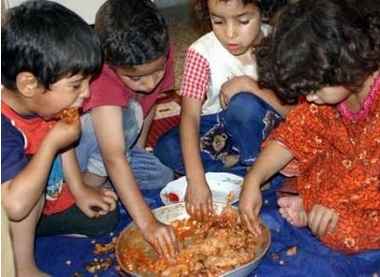
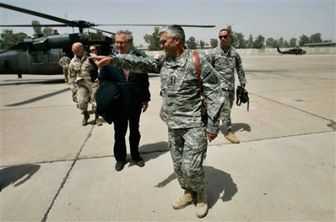
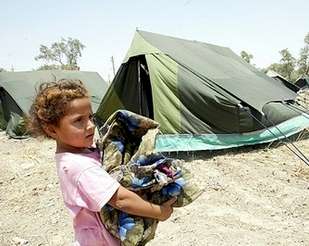
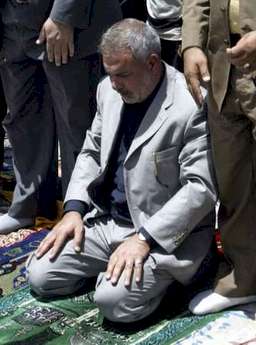 Sadr city on June 16th 2006, is a powerful figure within the ruling Shi'ite bloc. It appears that the Australian security personnel were a protection detail for a visit by Greg Hull. Hull is Australia's STC (Senior Trade Commissioner) for Iraq, Jordan and the Palestinian territories and was apparently not present at the time. Various reports suggest that they "became nervous" and opened fire at the car containing bodyguards who were (of course) in plain clothes and armed with the ubiquitous AK-47. From the reports of eyewitness accounts of the killing the Australians thought that the car containing the bodyguards was trying to overtake theirs and opened fire killing one bodyguard, two civilians, and wounding three other bodyguards
Sadr city on June 16th 2006, is a powerful figure within the ruling Shi'ite bloc. It appears that the Australian security personnel were a protection detail for a visit by Greg Hull. Hull is Australia's STC (Senior Trade Commissioner) for Iraq, Jordan and the Palestinian territories and was apparently not present at the time. Various reports suggest that they "became nervous" and opened fire at the car containing bodyguards who were (of course) in plain clothes and armed with the ubiquitous AK-47. From the reports of eyewitness accounts of the killing the Australians thought that the car containing the bodyguards was trying to overtake theirs and opened fire killing one bodyguard, two civilians, and wounding three other bodyguards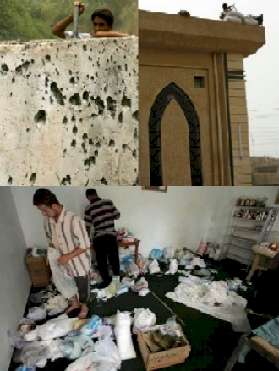 Scenes such as this are now common in Baghdad. The outbreak of inter-communal violence involving rocket attacks, mortars, grenades, shootings, and of course car and roadside bombings have escalated dramatically since last Thursday night.
Scenes such as this are now common in Baghdad. The outbreak of inter-communal violence involving rocket attacks, mortars, grenades, shootings, and of course car and roadside bombings have escalated dramatically since last Thursday night.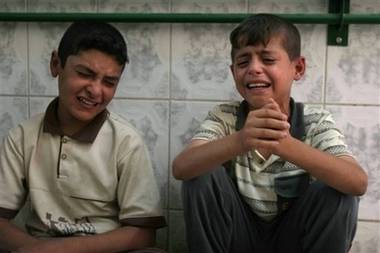 Outside of Baghdad the situation in the usual "hotspots" continues to deteriorate in Baquoba this morning there was a driveby shooting of a row of textile shops.
Outside of Baghdad the situation in the usual "hotspots" continues to deteriorate in Baquoba this morning there was a driveby shooting of a row of textile shops.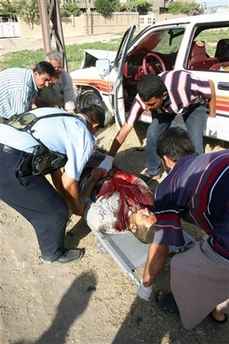 In the north of the country as might also have been expected determined efforts to prevent seccessionist Kurds from taking over Kirkuk completely are also intensifying. The Kurds have long dreamt of a homeland of their own. Understandable considering how they are treated. Several discoveries of oil are intensifying their efforts to establish an independent Kurdish state. This is particularly problematic in Kirkuk which has been an arab town since ancient times. Saddam savagely repressed the Kurds and mounted what can only be described as pogroms against them. to this end he tried to further "arabise" the town by importing population from other parts of Iraq. Following the fall of Sadam's regime Kurdish militia engaged in an orgy of looting and killing in Kirkuk against arabs and turkmen. The photo to the left shows the body of a petroleum engineer shot this morning being taken from his car. I expect attacks against anybody involved in the petroleum industry in the north to intensify sharply.
In the north of the country as might also have been expected determined efforts to prevent seccessionist Kurds from taking over Kirkuk completely are also intensifying. The Kurds have long dreamt of a homeland of their own. Understandable considering how they are treated. Several discoveries of oil are intensifying their efforts to establish an independent Kurdish state. This is particularly problematic in Kirkuk which has been an arab town since ancient times. Saddam savagely repressed the Kurds and mounted what can only be described as pogroms against them. to this end he tried to further "arabise" the town by importing population from other parts of Iraq. Following the fall of Sadam's regime Kurdish militia engaged in an orgy of looting and killing in Kirkuk against arabs and turkmen. The photo to the left shows the body of a petroleum engineer shot this morning being taken from his car. I expect attacks against anybody involved in the petroleum industry in the north to intensify sharply.